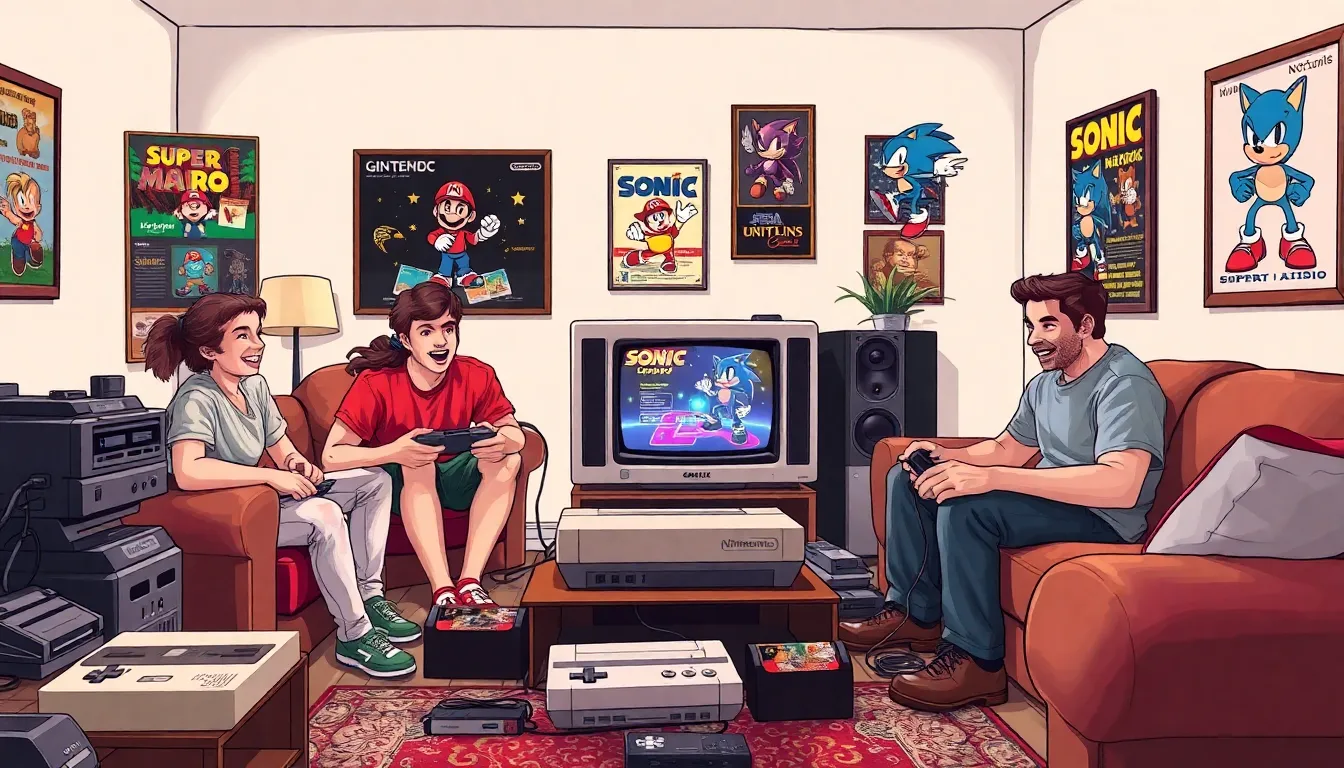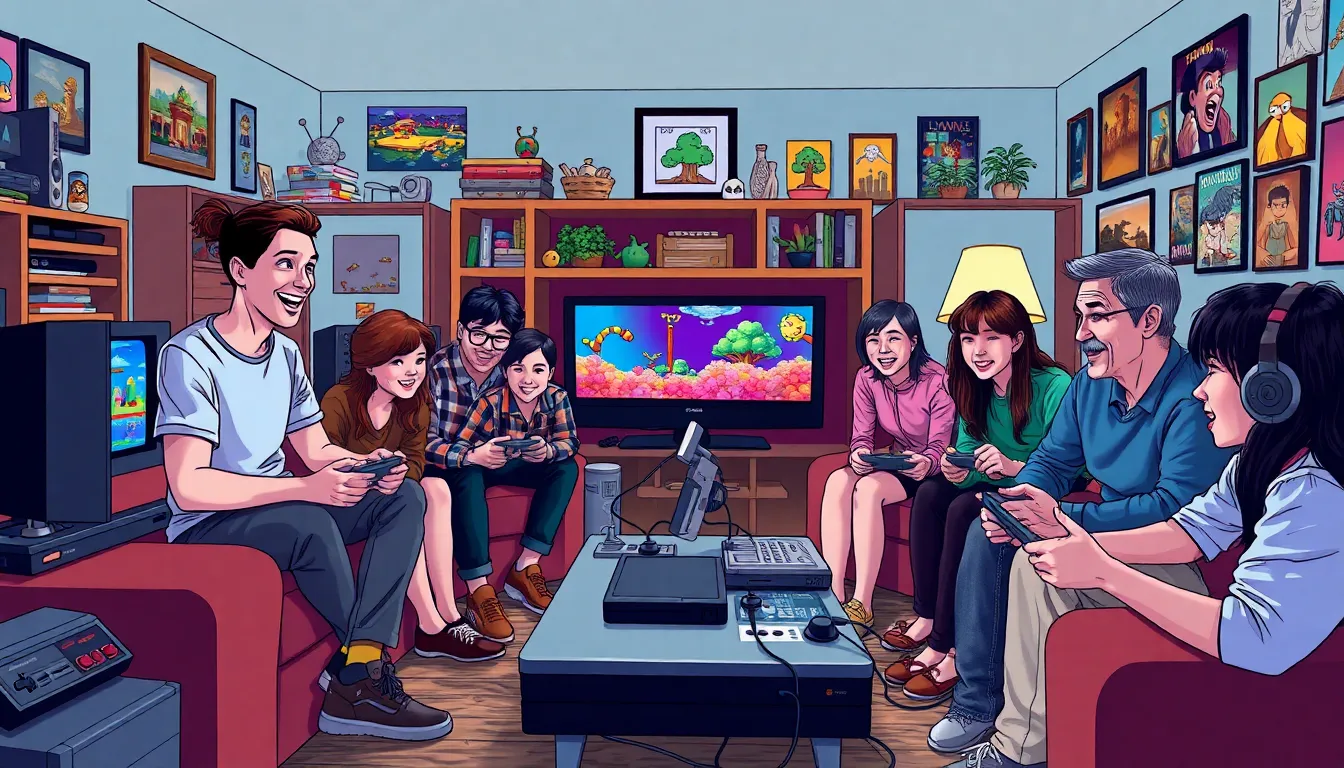In a world dominated by high-definition graphics and online multiplayer mayhem, the retro game community stands as a vibrant oasis of pixelated nostalgia. Gamers of all ages are dusting off their old consoles and diving back into the 8-bit adventures that defined their childhoods. Whether it’s the thrill of dodging barrels in Donkey Kong or the epic quest to save Princess Zelda, retro gaming offers an escape like no other.
Table of Contents
ToggleOverview of Retro Game Community
The retro game community thrives on nostalgia and shared experiences. Gamers connect through classic titles that spark memorable moments from their childhood.
Definition and Significance
The retro game community encompasses enthusiasts dedicated to classic gaming experiences. It includes fans of games from the 1970s to the early 2000s. This community plays a vital role in preserving gaming history, as passionate individuals and organizations work to archive and promote these older games. Preservation efforts enhance the appreciation of game development and artistry from earlier decades. Engagement within the community fosters friendships and creates opportunities through meetups and online forums. Participating in this culture allows gamers to explore the significance of classic titles, reinforcing their importance in the evolution of interactive entertainment.
Key Characteristics
A few key characteristics define the retro game community. First, passion drives members to collect, play, and discuss classic games. Many community members seek out original cartridges and consoles, turning their living spaces into nostalgic museums. Additionally, shared experiences in gaming bring people together, leading to events like retro gaming conventions. Gamers often engage through social media platforms, where they share gameplay stories and artwork related to their favorite titles. Community members frequently embrace creative projects, producing fan art and game mods that celebrate beloved classics. These characteristics shape a vibrant environment that honors the past while fostering innovative expressions of nostalgia.
Popular Retro Games

Retro gaming captures the hearts of many who treasure classic titles. Nostalgia drives the popularity of these games, connecting players through shared experiences.
Classic Consoles and Titles
Classic consoles like the Nintendo Entertainment System and Sega Genesis introduced iconic games such as Super Mario Bros and Sonic the Hedgehog. Gamers revisit these classics for their simple yet engaging mechanics. Pac-Man remains a staple, drawing players into its maze with addictive gameplay. The Legend of Zelda paved the way for action-adventure titles, boasting rich stories and exploration. Retro gaming consoles often include built-in libraries of classic titles, enabling instant access to cherished experiences.
Impact on Modern Gaming
Modern games often draw inspiration from retro titles. Developers frequently incorporate pixel art styles and simplistic gameplay mechanics reminiscent of older games. Indie games thrive on these influences, capturing the charm of classic gaming within contemporary contexts. Game mechanics such as 2D side-scrolling and top-down perspectives are prevalent in new releases. Nostalgic DLC expansions also engage players, enhancing experiences by revisiting beloved settings and characters. The retro game community continuously influences gaming culture, fostering a blend of old and new for diverse audiences.
Community Engagement
Community engagement remains essential for the retro game community, uniting gamers through shared interests and experiences. Online forums and social media platforms play a pivotal role in facilitating discussions and connections among enthusiasts.
Online Forums and Social Media
Platforms like Reddit and Discord serve as hubs for retro gaming discussions. Gamers share insights, troubleshoot issues, and trade tips on finding rare titles. They also post gameplay videos, showcasing strategies and igniting conversations about nostalgic moments. Social media channels amplify these interactions, allowing members to celebrate new finds and foster friendships. User-generated content, such as reviews and fan art, enhances connections and sparks interest in lesser-known titles. Enthusiasts frequently create themed groups, promoting an environment where passion for retro games thrives.
Events and Conventions
Events and conventions bring together retro gaming enthusiasts to celebrate their shared love for classic titles. Popular gatherings like the annual Portland Retro Gaming Expo and the Midwest Gaming Classic feature panels, tournaments, and vendor areas showcasing rare games. Gamers trade collectibles, attend workshops, and engage with developers who emphasize the importance of classic games. Networking opportunities lead to the formation of local groups, fostering community and collaboration. Participating in these events nurtures friendships and sparks creative projects, allowing gamers to relive cherished memories and pass on their passion to future generations.
Contributions of the Community
The retro game community plays a vital role in preserving gaming history through collective efforts and shared passion.
Game Preservation Efforts
Organizations and individuals work tirelessly to archive retro games and consoles, ensuring access for future generations. They digitize old titles, making them available through emulation platforms and online repositories. Volunteers often contribute to this preservation by cataloging games and their histories, creating informative databases. Additionally, community-led initiatives promote the restoration of classic consoles, with enthusiasts repairing and refurbishing hardware. These actions help maintain the cultural significance of retro games while also encouraging awareness of gaming’s rich history.
Indie Developers and Retro Influences
Retro gaming significantly influences indie developers in various ways. Many indie titles incorporate pixel art and simplistic mechanics reminiscent of classic games. They often draw inspiration from iconic franchises, blending nostalgia with modern storytelling. Successful examples include games like Shovel Knight, which pays homage to 8-bit aesthetics while delivering fresh gameplay experiences. Developers also utilize feedback from the retro gaming community to refine their creations, ensuring a blend of old-school charm and contemporary engagement. This collaboration fosters innovation, bridging gaps between past and present gaming experiences.
Challenges Faced by the Community
Retro game enthusiasts encounter various challenges that affect their interests and activities within the community. These challenges range from misconceptions to the preservation of games and culture.
Misconceptions and Stereotypes
Many individuals view retro gamers as overly nostalgic or disconnected from modern gaming trends. Some think the community consists solely of older gamers reliving their childhoods, overlooking the diversity of ages and backgrounds. Enthusiasts often face stereotypes portraying them as hoarders due to their extensive collections of classic titles. Misunderstandings about retro gaming’s value persist, with some dismissing it as outdated or irrelevant. These preconceived notions can create barriers, making it harder for newcomers to engage and share their experiences.
Preservation of Games and Culture
The task of preserving retro games presents significant hurdles. Limited resources often hinder efforts to archive titles from the past, putting many at risk of being forgotten. Organizations strive to digitize games, ensuring future access, yet challenges in funding and technology can stall progress. Enthusiasts frequently work on refurbishing older consoles, yet finding replacement parts proves difficult. Enthusiastic communities form grassroots initiatives that help maintain game culture, yet their contributions often go unrecognized. Securing support for preservation efforts remains crucial to keep the legacy of retro gaming alive.
The retro game community thrives on shared experiences and a deep appreciation for gaming history. Its members celebrate classic titles that shaped the industry while fostering connections through forums and events. This vibrant community not only preserves nostalgia but also inspires modern developers to blend old and new elements in their creations.
Despite facing challenges like misconceptions and preservation hurdles, the passion for retro gaming continues to unite enthusiasts. As they gather to relive cherished memories and explore the significance of classic games, the retro game community remains a vital part of gaming culture. Their dedication ensures that the legacy of these beloved titles endures for generations to come.

